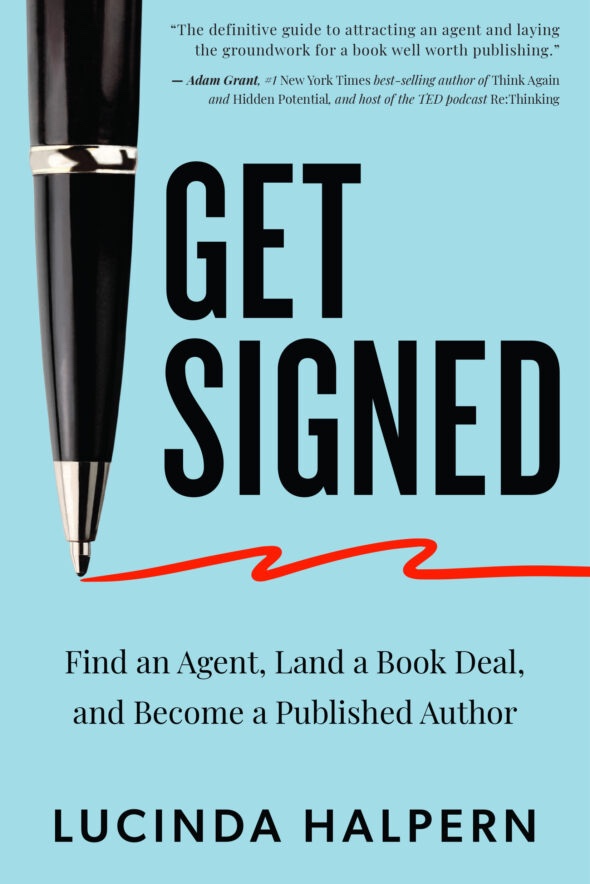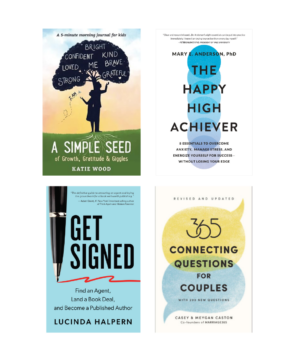Search
June 2024: How to Win at the Waiting Game
Lucinda Halpern shared her latest publishing insights from this month. Read on to see her latest news, and if you’d like to receive her monthly newsletter directly in your inbox, sign up here.
# # #
I want to take a moment to appreciate every little step you’ve taken or will be taking in crafting your book.
If you’re writing a book proposal or manuscript, how many weeks or months (or maybe years!) did it take to draft? And how long has it taken to edit what you wrote? Not to mention, how many rounds of querying agents have you gone through so far, hearing little to no response?
For the majority writers, publishing a book is a long game of waiting—which can be the toughest part. As someone who likes to move quickly in my own submissions to publishers, the waiting is HARD. During the summer months, when so many publishers and agencies are away on vacation, there’s even longer review time and more days of hearing no response.
This summer, I want you to make the mindset shift that you will become an author, and it’s only a question of when. If you want to get a book on track to being published, you need a plan—one with a fresh start to ensure that you’re making real progress in getting your book out there.
A six step plan for publishing your book might look like this:
Month 1: Consider Finding a Book Editor or Coach
Find the right outside editor or collaborator to edit your proposal or book. We represent some great ones. Many prolific thought leaders and artists engage ghostwriters and book coaches, and it can be transformative to your process as well as to your chances of publishing a stellar book.
Month 2: Determine the Right Agencies & Get Querying
While you or that person is putting finishing touches on your proposal or manuscript, begin researching your list of agents. Make it realistic: include a combination of solopreneurs, larger agencies and boutiques, but most important, those who are actively selling books in your genre. Once you’re confident in the list of 10-20 agencies you think will be a fit, begin your fearless outreach. This is a hefty month, because ideally you have also crafted a winning query letter (my formula for this is in Chapters 6 and 7 of Get Signed). Whatever you do, don’t forget your comparative titles (or “comps”)!
Month 3: Cultivate an Online Presence
You’re waiting for responses to your submissions… but try to ‘let go’ as it may be 2 months before you hear anything. In this time, focus on building your online presence.
Remember: The very first thing someone considering your book will do after reading your query is look you up online, so you’ll want to make sure they’ll find substantial information about you, your writing, your brand, or your work. They’ll also want to see that you have any of the following:
- A website that has—at the very least—a bio, a way to contact you, and any pertinent info about your book idea or related work
- An active social media presence (one that shows engagement from a number of people)
- Earned substantial credentials related to your book’s topic
- Media or features around you and your work
If you have none or very little of the above, then use this time while your book is on submission to get cracking and build your credibility. If you’re looking for more guidance on starting or growing a platform, I offer customized strategies for authors looking to get signed or successfully launch their books in my new Marketing Consultations!
Month 4: Time to Follow Up
If you have heard nothing from the agents you submitted to, I’d like to share a general guideline for when the time might be right to check in. Since there are often multiple readers and agents at a firm reviewing your query, potentially on top of your sample chapters or full manuscript, it’s best to give about 1 to 1.5 months before following up. And when you do, as a first step, always ask as a gentle check-in that the query was successfully received in their inbox.
When following up after ensuring it landed, it’s important to offer a constructive update. As I’ve often said to the writers I coach, you have to establish a clear “win-win” between you and the person you query. (The same goes for when you pitch your book to media outlets, after you have the book deal!) Effective relationship building is rarely, if ever, about a unidimensional ask for help.
As a useful push, consider notifying an agent of:
- An article recently published or in which you were recently prominently featured
- A podcast interview or news story demonstrating timeliness for your idea
- A recent deal of that agent’s or publisher’s that proves your work is also a hot topic
Don’t have one of the above to share? Aim for a personal connection: “As you’re the agent of [x comparable title], a novel that significantly influenced my own writing, any reactions you’ve had thus far would be especially meaningful to me…” continuing to say that your utmost wish would be a home with this particular agent.
Note that your follow ups should be truthful and avoid writing a first choice letter like the above to everyone on your submission list—only to those for whom it really applies. However you decide to follow up, be polite, be succinct, and most importantly, do your best to showcase what makes you and your idea special.
You can find even more tactics or example lines of meaningful follow up in my book, Get Signed.
Month 5: Revise & Resubmit
No bites? It may be time to revise and resubmit (yes, you can do this!) based on feedback you’ve received in following up, landing on an improved title or pitch, or having a new list of agents. During this continued waiting period, many writers I’ve worked with begin new book ideas based on what readers want and follow online trends found in book reviews, on Publishers Marketplace, and in real conversations. What could be more productive than that!
Month 6: Realizing a New Path Forward
Still no bites, but dedicated to getting your book out there? A hybrid or self-publishing route is a wonderful way to bring a timely message or story to the world and begin finding a new audience, laying the groundwork to realize a later route to break into traditional publishing or your new career as an author.
Jenny Blake of the fabulous book Free Time, a recent favorite of mine, pivoted from traditional to hybrid publishing. So has Mike Michalowicz of the bestsellers Profit First and Clockwork. As many of you know, our fiction client Jayne Allen began as a successfully self-published author—and later got a 4 book deal with HarperCollins!
In sum, the best way to find relief in the waiting game? Get productive. There’s so much you can be doing that will only help boost your chances of capturing an agent’s attention—even as you wait for them to review your query.
New Book Publishing Accelerators Program! To enroll in our Summer Curriculum, taking place from July 17th – August 21st 2024, click here.
Buy the Get Signed Book
If you’re just starting out, explore our beginner resources on Get Signed








